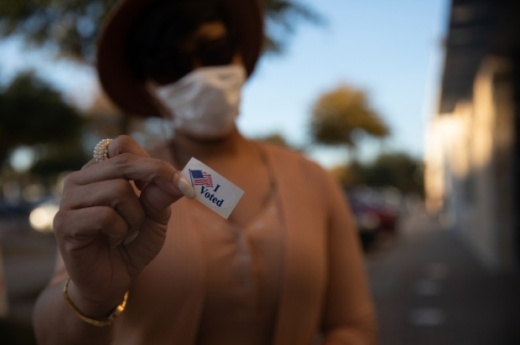Panelists Brandon Rottinghaus, a political science professor at the University of Houston; Jen Rice, a Houston Public Media political reporter; and anthropologist and journalist Cecilia Ballí discussed various topics, including the lack of a "blue wave" in the state, the impact of Latino voters on Texas elections, and the redistricting efforts that could stretch through the Legislature's spring session.
Election reflections
One trend the panelists discussed was an anticipated "blue wave" for Texas Democrats that did not materialize in the general election despite record-high statewide voter turnout.
Rottinghaus said state Republicans may have learned from 2018 midterms, which saw some Democrats outperform fundraising and organizing forecasts, as no Texas congressional seats flipped parties in 2020.
“Obviously, turnout was really high, and the expectation was that that would flip a lot of Democratic seats. It didn’t. I think that we found that the Democrats definitely saw a rising tide, but they still need a dock to port in, and that’s not something that they necessarily have," he said. "I think that’s an issue for them, being able to try and develop a message that works in Texas.”
Rottinghaus also pointed to a shift in campaigning methods though the COVID-19 pandemic, as well as the results of a relatively uncontentious 2019 legislative session that produced long-awaited education funding and property tax bills, as positives for state-level Republican incumbents.
"Republicans showed that they didn’t have a lot of slack in their rope. They really did out-raise, out-organize and, in some cases, outwork the Democrats," he said. "It wasn’t that they beat them by 15 points the way they did in the 2000s, but they certainly won."
Rice noted the variety of legal challenges related to the election that were seen throughout Texas, and especially in Harris County, as an added challenge for voters to contend with this year. Despite the uncertainty surrounding the availability of certain voting methods, however, she said turnout at facilities, such as drive-thru voting centers, appeared consistent during the election.
Ballí said she spent time this year interviewing a broad range of voters and nonvoters throughout Texas for their perspective on this year's election, including the Latino population, which she noted as being increasingly unattached to either major political party.
“Our studies show that Latinos, on either side and from either party, don't feel seen and heard and represented. ... They felt that they’re taken for granted," she said. "The Latinos who voted Republican in the Rio Grande Valley were talking about how the Democrats only saw them for their ethnicity and put them into a box. ... We tend to think of them mostly as single-issue immigration voters, and they are not.”
Legislature lookout
Looking ahead, the panelists also noted the effects of the election on the redistricting work that is likely to be a major focus of state lawmakers in 2021. Rottinghaus said some changes to districts' boundaries statewide could skew red due to Republican control of the state house and courts throughout next year's redrawing process, although he noted that past partisan efforts to realign districts have not always produced intended results.
"You can be too cute when you do this. You can make mistakes," he said. "The state’s moving in such a direction that it's impossible to say for sure whether these districts will be truly Republican. So it’s going to be pretty tense."
Rice said the lack of turnover experienced in many Greater Houston-area districts this fall could also affect regional policy concerns centered on survival, including the health and financial strains of the pandemic, housing instability and environmental resiliency.
"The state house flipping or not flipping has a huge impact on Houston," she said. "The Legislature only meets every other year, and so that’s every two hurricane seasons for us. So if you want your flooding bill passed, you have to wait a while."





